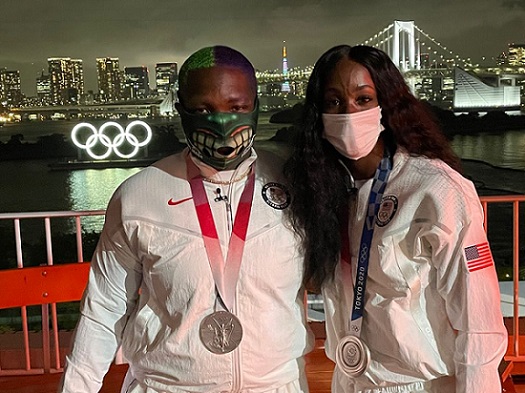The International Olympic Committee (IOC) has said that it is investigating the 'X' gesture made by the US silver medalist Raven Saunders, now largely being referred to as the first podium protest of the 2020 Tokyo Olympic Games.
25-year-old shot putter Saunders, who also calls herself the 'Hulk' and competes wearing a superhero mask, on Sunday became only the third American woman ever to win an Olympic medal in the women's shot put event.
After claiming the silver, Saunders crossed her arms in an 'X' gesture during the medal ceremony photo op which could be a potential breach of IOC rules clearly banning protests on medal podiums.
Podium boss Raven “Hulk” Saunders.#BlackLivesMatter #Intersectionality #Olympics #RavenSaunders pic.twitter.com/ZPHBRcNSza
— Bob Marcacci (@BobMarcacci) August 2, 2021
Saunders, one of the over 160 odd LGBTQ athletes competing in Tokyo, later said that the X represented "the intersection of where all people who are oppressed meet", and that the gesture also meant support for the the Black community and people dealing with mental health issues.
"For me, I represent so many wonderful communities who are constantly being held down all around the world. I just want to stand up for them, let them know that there’s somebody who represents them, looks like them, who understands the things they’re going through, who’s willing to use their platform to speak up," she said.
The US shot putter's expression could however land her in trouble as the IOC Rule 50 Guidelines and disciplinary procedures clearly state that a range of sanctions can be imposed if the podium, field of play (FoP) and official ceremonies are used by the athletes for any kind of protests and demonstrations, or any acts perceived as such.
Stating that the focus of the Olympic Games remains on the celebration of the athletes' performances, sport and the Olympic values, the IOC had last month even extended opportunities for athlete expression during the Tokyo Olympic Games. The new set of guidelines gave further clarity and guidance to the participating athletes on the wide range of opportunities available to them to express their views, including on the FoP prior to the start of the competition.
"The new guidelines are a result of our extensive consultation with the global athletes' community. While the guidelines offer new opportunities for athletes to express themselves prior to the competition, they preserve the competitions on the Field of Play, the ceremonies, the victory ceremonies and the Olympic Village," said Chair of the IOC Athletes' Commission Kirsty Coventry.
While Saunders appears defiant – she tweeted "Let them try and take this medal. I’m running across the border even though I can’t swim" – the United States Olympic and Paralympic Committee (USOPC) has backed its athlete saying that her gesture did not breach the rules.
"Per the USOPC's delegation terms, the USOPC conducted its own review and determined that Raven Saunders' peaceful expression in support of racial and social justice that happened at the conclusion of the ceremony was respectful of her competitors and did not violate our rules related to demonstration," Reuters quoted a statement from the body.
“Hulk Smash All Day” Raven Saunders America’s shot put superstar @GiveMe1Shot pic.twitter.com/0ihS2nMAM1
— New York Basketball (@NBA_NewYork) August 1, 2021
The latest episode at the world's biggest sporting extravaganza has again drawn worldwide attention to athletes protesting and demonstrating at global events. In an open letter sent a few hours before the opening ceremony of the Tokyo Olympic Games on July 23, more than 150 signatories had called on the IOC and International Paralympic Committee (IPC) leadership to amend their rules around political demonstrations at the Games.
The 'experts' on the intersection of human rights, social justice, and sport across all five continents called for amendments to IOC Rule 50/IPC Section 2.2 to demonstrate a commitment to human rights, racial justice, and social inclusion in the Olympic and Paralympic movements.
"For the Tokyo and Beijing Games (2022), refrain from imposing sanctions on athletes protesting and demonstrating in accordance with internationally-recognized human rights frameworks in any Olympic/Paralympic sites, venues or other areas – including the podium. These frameworks protect protests in support of racial and social justice (e.g., kneeling, raising one’s fist)," the letter said.
Also Read: Fans say 'chak de India' after women's hockey team scripts history at Tokyo Olympic Games




















